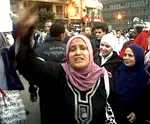Arab world: Twenty measures for equality between women and men
Published on Thu, 2012-03-08 13:21
On the occasion of International Women’s Day, the International Federation of Human Rights (FIDH) and 14 citizens’ organizations of the Arab world, among them several members of Social Watch, called upon national governments and parliaments to implement 20 measures to establish the equality between women and men. “Women, as well as men, paid and continue to pay a high price for their struggles” in the protest movements that shook the Arab world in 2011, declared Souhayr Belhassen, FIDH President. “Today women must be able to play their full part in building the futures of their countries. Women’s participation in public and political life, on an equal basis with men, is an essential condition for democracy and social justice, values at the heart of the Arab spring,” she added. “Demands for equality tend to be set aside, while the efforts of protesters focus on bringing down regimes and dismantling oppressive state institutions,” stated Sophie Bessis, FIDH Deputy Secretary General. “Recent history painfully reminds us that the massive occupation of public space by women during revolutions, in no way guarantees their role in the political bodies of the regimes that follow”. “At these times of great change and as conservative forces appear to be growing in strength, it is vital that steps are taken to establish and protect equal rights between men and women, as the very foundation of democratic societies,” concluded Khadija Cherif, FIDH Secretary General. “To the governments of region and the international community, we address this message: the rights of women are a priority and must be at the core of political reforms”.
Twenty measures for equality Among the signatories of the appeal launched by the FIDH, there are several members of Social Watch such as the Bahrain Human Rights Society, the Human Rights Information and Training Center (Yemen), the Tunisian Association of Democratic Women and the Tunisian League for Human Rights. “Women, alongside men, participated in the protest movements that shook the Arab world in 2011, demanding freedom, equality, justice and democracy. Women, as well as men, paid and continue to pay a high price for their struggles. Today women must be able to play their full part in building the futures of their countries. Women's participation in public and political life, on an equal basis with men, is an essential condition for democracy and social justice, values at the heart of the Arab spring,” reads the declaration that prologues the “Twenty measures for equality”. “The signatory organizations to this appeal call upon national governments and Parliaments to implement the following ‘20 measures for equality’. They also call upon international actors to support the implementation of these measures by: supporting national and regional women's rights movements and civil society organizations; systematically including women's rights in bilateral and multilateral political dialogues; and systematically including women's rights, with specific objectives and indicators, in all cooperation programs,” adds the statement. The signatories called on national authorities to: 1. Guarantee women's access to all political posts; 2. Adopt laws and policies requiring gender parity or, at a minimum, quotas of at least 30% of women in all political decision making bodies and elected assemblies; 3. Ensure the effective participation of women in all stages of elections, including within the body overseeing elections; 4. Conduct outreach and civic education campaigns to explain the rights of women, as voters and candidates and in the electoral process; 5. Adopt measures aimed at increasing the representation of women in the judiciary. 6. Enshrine in the constitution, the principle of equality between men and women and the prohibition of all forms of discrimination against women; 7. Reform all laws that discriminate against women, including in the area of the family: marriage, divorce, guardianship, child custody, inheritance, the transfer of nationality to spouses and children and legal capacity; and ensure the full compliance of all legislation with international conventions, in particular the Convention on the Elimination of All Forms of Discrimination Against Women (CEDAW). 8. Adopt laws prohibiting all forms of violence against women, including domestic and sexual violence and sexual harassment; 9. Put in place adequate shelters and medical and psychological support services for women victims of violence; 10. Fight impunity of all perpetrators of violence against women, by ensuring effective investigations, prosecution and punishment of these crimes; 11. Ensure that women have full access to justice, including the provision of free legal services and establishing appropriate complaint mechanisms; 12. Ensure that all actors in the justice system (police, judges, lawyers) receive adequate training on laws protecting women from violence and the treatment of victims of such crimes; 13. Adopt preventive measures, including information and education campaigns, to eliminate violence against women. 14. Establish policies to ensure access for girls and women to education and eradicate illiteracy; 15. Enact laws and policies to reduce high unemployment rates among women, ensure that women and men receive equal pay for equal work; combat the gender-based division of labour; and ensure that women have full and equal access to economic resources, including in rural areas; 16. Promote the representation of women in the decision-making bodies of trade unions; 17. Strengthen measures aimed at increasing access of women and girls to adequate health services, particularly with regard to reproductive health.. 18. Withdraw all reservations to CEDAW. 19. Ratify all international conventions on women's rights and ensure the full implementation of their provisions. 20. Cooperate with UN mechanisms protecting women's rights (including the CEDAW Committee, the Working Group on laws and practices that discriminate against women and the Special Rapporteur on violence against women) and implement their recommendations.
First signatures International Federation for Human Rights (FIDH) Sources » |
SUSCRIBE TO OUR NEWSLETTER



